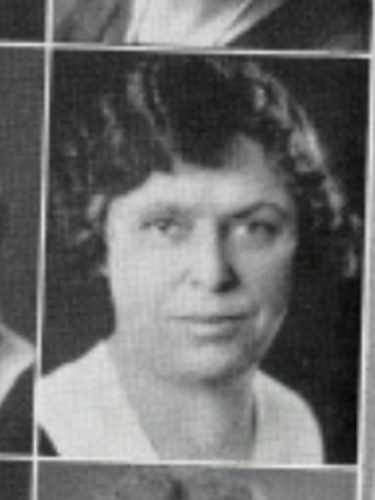
Jennie Moore
In her time as an education professor at CWU, Jennie Moore made an impression. Born in 1889 in Michigan and the Spokane area, Moore graduated from the Washington State Normal School with a BA in education in 1925 and, after teaching in Montana, joined the faculty at Central four years later.
As a member of the faculty, Moore’s expertise was in providing instruction for rural school teachers who would be working in one-room schoolhouses in the state. Among the classes that Moore taught were schoolroom management and rural school procedures.
The Quarterly of the Washington State Normal School catalog, published in 1929, noted, “The training of teachers for rural schools is conducted in a group of typical one-, two-, and three-teacher schools located only a few miles from the Normal School campus.
“Students who wish to teach in rural schools are given the opportunity to observe all types of school activities, to study first-hand the problems of organizing and conducting such schools, to teach in rural schools, and to assist in the social activities of the community in which the school is located.”
In 1937, Moore took a break from teaching at the normal school to pursue a master’s in education at Columbia University’s Teacher’s College in New York.
The July 15, 1937 edition of the Campus Crier, the university’s student newspaper, noted that “Miss Jenny Moore of the Education Department is taking nine months leave of absence, beginning next fall.
“As soon as the grades are in and her apartment is dismantled, she will leave for eastern Washington to take a well-earned rest until the latter part of August,” the article said. “During this time, Miss Moore intends to lead the simple life and to forego all intellectual effort except that of reading.”
Moore successfully completed her training at Columbia, earning her master’s degree in education on June 1, 1938. On August 29, Moore had begun her journey back to Ellensburg to resume teaching at Central when she suffered a heart attack in Charlottesville, Virginia, and died. She was buried at the Riverside Memorial Park in Spokane.
In 1938, the Jennie Moore Memorial Scholarship was started in her honor. For the next few decades, the $100 scholarship was awarded annually to a worthy student “based on personality traits and professional promise.”
In 1961, the university completed construction of a multi-story dormitory complex that was named Anderson-Moore Hall, in honor of Mabel T. Anderson, a longtime Central teacher, and Moore. The architectural style of the twin brick and concrete buildings, which are virtually identical and connected by an open breezeway, is a neo-formal expression of mid-century modern design.
Moore was posthumously awarded the “Honor Key,” the highest national honor of the Kappa Delta Pi international honor society in education.






comments powered by Disqus